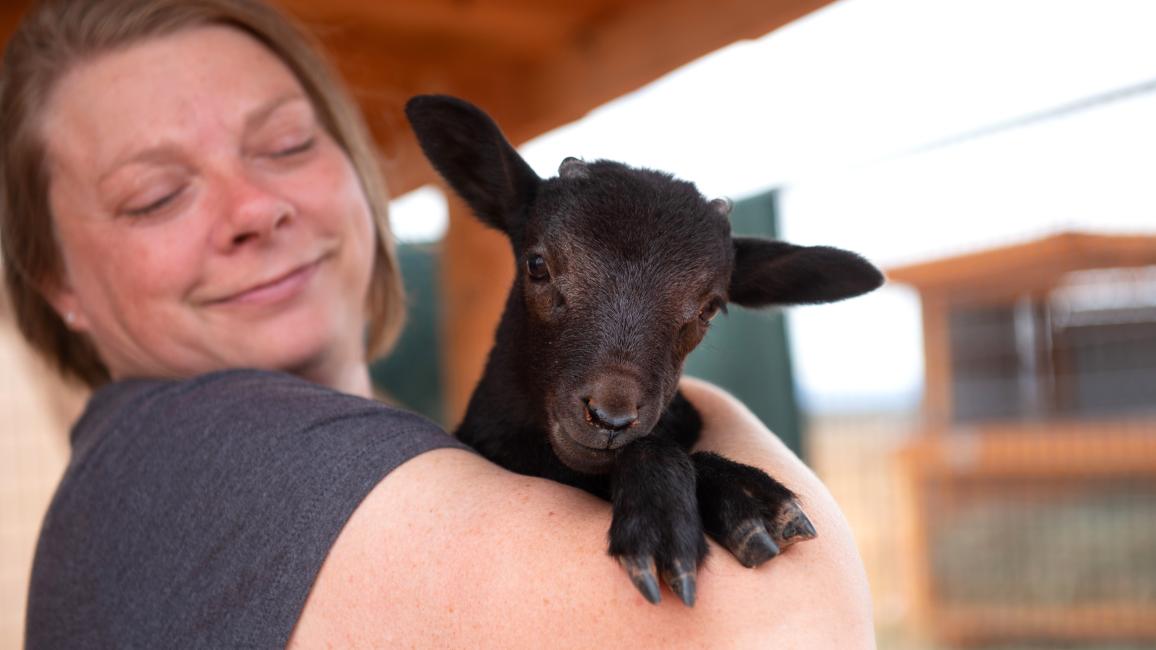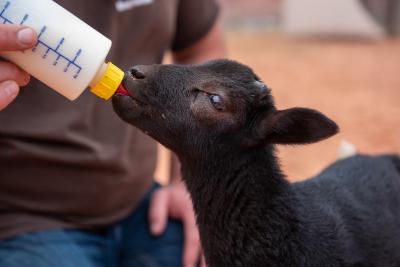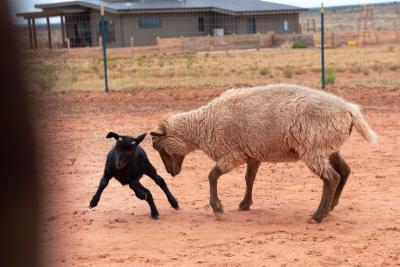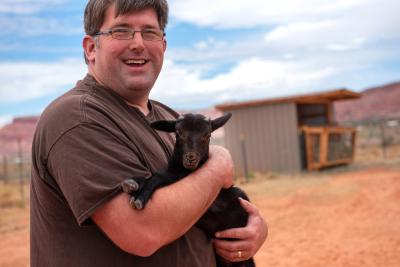Orphaned lamb is beloved black sheep of the family

As he springs through his paddock and noses up to the gate to greet his people in the morning, Emmett is a picture of pure happiness. He’s all excited bleating and frantic tail-waggles, ready for whatever fun the day has in store for him — and breakfast, of course. This snuggly lamb, almost the size of the adult members of his flock, is a total lovebug. But not too long ago, he was fighting for his life.
Emmett was just a few minutes old when he tragically lost both his mother and twin sibling. Before he could even stand up, he was an orphan. And then the little lamb also lost his home when his people couldn’t care for him.
A kind family took him in and did their best to raise him, but they were used to taking care of cows, and sheep have very different needs. The milk substitute given to Emmett gave him diarrhea, and an ingredient in cow antibiotics (tetracycline) caused his ligaments to go slack. It was understandably a nerve-wracking experience for people who were just trying to do their best for this tiny little lamb.
Things eventually started looking up for Emmett when he arrived at Best Friends Animal Sanctuary. He was only three weeks old and needed bottle-feeding every three hours. He also needed other sheep to socialize with, but at that time there weren’t any sheep buddies at the Sanctuary.
Luckily for Emmett, Megan and Matt Claflin had a flock of their own, so they were already confident in caring for sheep. When they heard about the orphaned lamb, they agreed to foster him.

Lamb leaps and bounds
The night before Emmett was due to move to Matt and Megan’s place, a vet was rushed to his side for one more medical scare. He was bloated, a condition that can often be fatal. Everyone was on edge. “We were nervous he wouldn’t make it to us,” Megan recalls. “But he did.”
With quick treatment and careful monitoring, Emmett made it through the night. But he wasn’t quite yet out of the woods. When he arrived at his foster home, he weighed just eight pounds. (They would later joke that he was smaller than any of the family’s cats.) And his legs were still wildly wobbly from the loose ligaments. Nothing could be done for his legs, though, except hope for the antibiotic ingredient to wear out of his system, allowing things to go back to normal. And, with some time, it did.
[Watch baby goats kid around at Best Friends]
Soon, Emmett was up on all four hooves, wobbling around and constantly looking for his bottle. Every three hours was mealtime, so Matt and Megan set their alarm clock for the middle of the night. Megan says it was more challenging than, say, bottle-feeding kittens. “Unlike other bottle babies, we didn’t just go into the bathroom to feed him. “We had to suit up and go out into the field.”
It was cold and exhausting, and in the cover of night all sorts of spiders and wildlife caught the reflection of the flashlight. But it was worth it.
On the right diet, Emmett grew quickly. Matt and Megan started tracking his shoulder height on a fence post, and within just a few weeks, he was almost three times the size he was when he arrived. At six weeks old, his horns were already two inches long.
His personality blossomed, as well. Emmett became an energetic snuggler. He’d cuddle up to his people and chew on Megan’s hair. He gave kisses and liked being picked up for even more cuddles. When he was in a playful mood, he’d set off at a sprint and then start bouncing — leaping and springing forward one hop at a time until he screeched to a stop, sending dirt flying in every direction.
Sometimes, when Matt or Megan went out for nighttime feedings, they found their camping chair covered in playful little lamb prints or knocked completely over. And when Emmett had the chance, he played with the older sheep, who mostly indulged him with gentle head-butts until they were worn out.
“He really is happy all the time,” says Matt.

Big-horned adolescent
These days, Emmett’s horns are closer to six or seven inches long, and they’re starting to curl into that familiar ram shape. And while he’s not gaining much in height to mark on his fence post, he’s still packing on the pounds as he grows into adulthood.
“Measuring height is still pretty easy,” Matt says. “The trick is the weight, because the only way to weigh him at our house is to climb on a human scale by ourselves and then climb on while holding him. And that’s not quite as easy now. He’s definitely not a full-grown sheep, but he’s no longer a small little lamb.”
He’s also finally weaned from the bottle. Timothy pellets and black oil sunflower seeds became part of his breakfast and dinner, with hay available full-time as bottle feedings gradually spaced out. And once the last of the milk was gone, he went on the same feeding schedule as the rest of the flock.
“He was a bottle-baby for three months and it felt like a long time,” says Matt. “It was totally worth it. We would do it again, if necessary, at some point. But we’re certainly happy to sleep a full eight hours.”
[Wild mustang mares and foals make Best Friends their winter rest stop]
Emmett’s tiny baby “baa” has turned into a deep bass-y rumble, which Megan says is ridiculously cute in its own right — especially as he continues to skip and bounce gleefully around the pasture.
Now, the only things left on Emmett’s to-do list are getting neutered and properly joining the family flock. Because male sheep tend to form bladder stones, Matt, Megan and Sanctuary veterinarians are giving him plenty of time to grow and develop before surgery.
Until then, he has his own space in the middle of the sheep pasture, and he and his woolly friends spend much of their time hanging out together at the fence line. “We’ll be really happy when he can be with the rest of the herd. He’s just too exuberant right now,” Megan says. “And of course, we’re happy to rescue lambs. We just don’t want to make more of them.”
Come the new year, though, Emmett will be ready to leap and bound around with the rest of the flock. And it looks like he’ll even be making himself a permanent member of the family.

Ready to foster a pet?
Whether you only have a day or are looking for a long-term houseguest, any time fostering a pet from your local shelter is time well spent.
Read more
U.S Forest Service mule coasts into retirement
Three-legged baby goat gets a new leg and an unlikely new best friend — a chicken